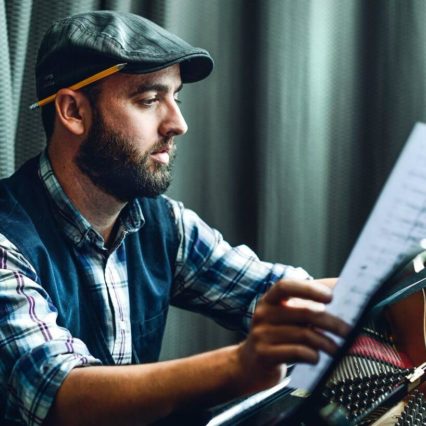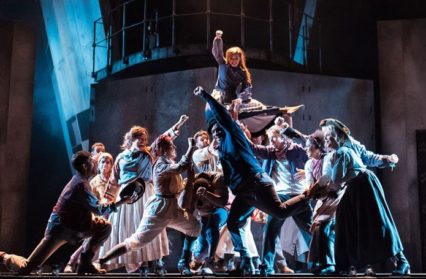Emily Garside casts a critical eye over Daf James and Michael Williams’ Tiger Bay The Musical and evaluates whether it is the ‘Welsh Les Mis’.
There are two problems with Tiger Bay The Musical being discussed as the ‘Welsh Les Mis’. Firstly, we need new musical theatre to be taking on its own identity, not trying to mimic works of the past. Secondly, these comparisons will constantly so long as the show wants to be the ‘Welsh Les Mis’, the ‘Welsh Billy Elliot’, the ‘Welsh Oliver’ before going a full ‘Welsh Annie’ in Act 2. Unfortunately, with this approach, little of it has time for development even with the its three hour running time.

Tiger Bay should provide a good backdrop for any kind of drama; the melting-pot dock area, the civil unrest of the 19th Century, all are rich for story-lines. The angle of immigration, and competition for jobs certainly rings strong in post-Brexit Britain. Had Daf James and Michael Williams (Music and Lyrics) chosen to focus on this angle alone there was a strong story in the making. Certainly, the story of Zolani Shangase (Yusef Al-Hazari) the ‘Donkey Man’ who arrives in Cardiff, struggles to find work, then finds himself the target of racist taunts, makes a strong and resonant narrative.
Whatever issues there are with Tiger Bay they are with the book, not the music. Composed by Daf James, and directed with precision by Melly Still, it is the production’s saving grace. James has composed a score that is completely its own animal. He does what every good musical theatre composer does and draws subtle influences from other works but spins them to be all his own. More than that he does what the innovators of musical theatre have always done and pulls in influences from other musical genres, but integrates them seamlessly into his score.
Still’s direction, where she integrates Melody Squire’s excellent choreography, is energetic and drives the piece forward. Still also works brilliantly with the foreboding atmospheric set Anna Fleischle creates, rarely is the stage at the WMC used so fully. Still’s real skill is in bringing together these disparate elements and creating something cohesive out of the chaos. The actors also rise to the challenge and the ensemble are the driving force of this work.
However, it remains a musical that is confused about its own identity. On the one hand, clinging stubbornly to its Cardiff roots, many local ‘jokes’ would fall flat should the show travel further afield (and it should be noted that many colloquialism are out of sync with the period in which it sits). Meanwhile the set and story remain firmly an in ‘anywhere’, the greyscale set is usefully devoid of identifying features that mean it could be taking place in any docks in the period.
Likewise, the elements of the real-life story, the Marquees and his reclusive, philanthropic life are left suitably obtuse that the story could translate to anywhere. While universalism is a useful tool, it makes the Cardiff link to Tiger Bay feel thin and lacking. No matter how many times they repeat the title of the musical (and that’s a drinking game you don’t want to play), without that feeling of rooted identity and history it all rings a bit hollow.
Hollow is also the feeling the characters create; in an attempt to cram in as many story-lines as possible, not enough time is spent developing any characters, therefore, it’s nearly impossible to grow attached to any of them. It should be a story filled with heart, from the unlikely bond between Themba (Dom Hartley-Harris), a refugee of Boer War, and his water-boy Ianto (Ruby Llewelyn) is genuinely sweet and endearing. However, their tale is distracted by a sub-plot in which Ianto is posited as the Marquess’ son, and Themba’s story complicated by an unnecessary love arc with O’Rourke’s (Noel Sullivan) fiance (Vikki Bebb), which is further complicated by O’Rourke’s ongoing dalliance with Tiger Bay prostitute Klondike (Busisiwe Ngejane).
Due to the overflowing cast list many characters get lost. For instance, a criminally under-used John Owen-Jones is left as a side-plot with limited chance to show off his ever-impressive vocal talents. Indeed, it seems the moment he gets to finally show off that voice – which rings beautifully out acapella in the WMC – that he’s snatched away again for one of the other plots to take the stage.
This typifies the key issue Tiger Bay suffers from; it tries to do so much that the moments of genuine magic or emotion are snatched away before the audience gets a chance to settle into them, never mind enjoy them. To labour the Les Mis comparisons, what that and the other greats of musical theatre know how to do is to pace the story, and give it chance to breathe. In Tiger Bay, as frantic as the title number, it barely comes up for air.
To find out more about Daf James visit his webpage.
Emily Garside is a regular contributor to Wales Arts Review.












